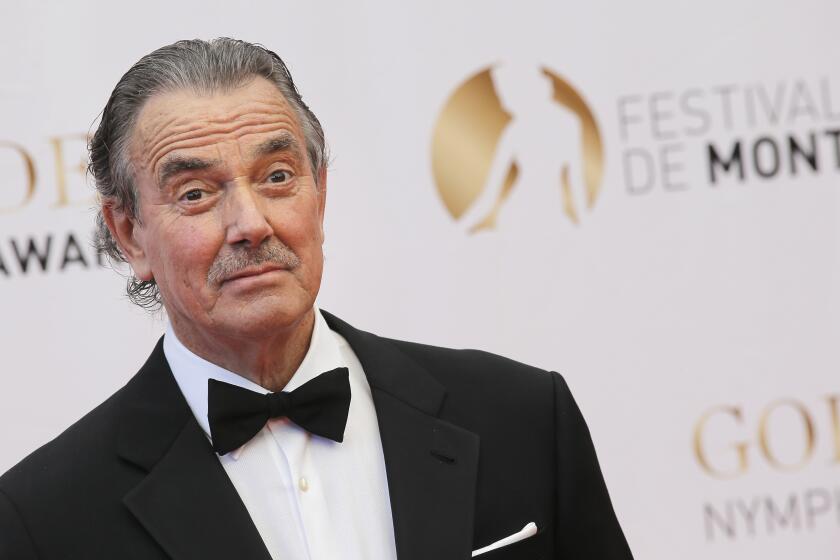Review: ‘Fargo’ blazes a dark new trail on TV
The Coen brothers’ 1996 comedy-noir masterpiece “Fargo” wasn’t so much a movie as it was a cultural event — you remember where you were when you first saw it. That endless yet claustrophobic snow scape, the anxious narcissism of William H. Macy’s scheming car salesman, the glory of Frances McDormand’s pregnant police chief Marge.
It blew out the wall between hilarity and horror to prove that both dwell in the same landscape. It showed that senseless violence was simply one more item on the spectrum of human behavior, alongside love and honor and courage.
In many ways, this revelation led to the birth of modern television. Three years after “Fargo,” HBO debuted “The Sopranos,” which took the characteristics represented by “Fargo’s” characters and put them into one person: A mobster with panic attacks.
And so began TV’s obsession with excavating human consciousness via the most troubled characters we could create. The line between Macy’s twitchy Jerry Lundegaard and Bryan Cranston’s initially beleaguered Walter White is neither long nor terribly twisty; Walter just surrendered to his baser self more fully.
WATCH: ‘Fargo’ TV series gets its first full trailer
So it is only fitting that “Fargo” would make its way to television. In this 10-episode series, the TV version pushes the art form even further, though this time more in form than function.
An atmospheric homage that quickly stands on its own nimble feet, FX’s experiment in cinematic crossover does take some getting used to. Written by Noah Hawley (with the Coens’ blessing) this “Fargo” is at once eerily similar and completely different. The first episode especially is a bit like being caught in a dream; everything’s intensely familiar, yet several ticks off.
Once again we’re traveling down a narrow strip of highway that bifurcates the snowy plains of Minnesota into a tiny town where the local accent is a running joke and the introduction of violence is about to turn everything inside out. As in the film, there are familiar characters — a hit man, played here with darkling brilliance by Billy Bob Thornton; a whining milquetoast with marriage issues (Martin Freeman); and a canny if generally good-hearted female police officer (Allison Tolman).
There are also murders, fumbling lies and the blinking bewilderment of people forced from the numbing reverie of congenial ignorance; this last provides much of the humor. But where “Fargo” the film followed the violent domino-fall of half-baked plans, the TV series has a more specific and purposeful driving force.
BEST TV OF 2013 Lloyd | McNamara
That would be Thornton’s Lorne Malvo. A fixer, assassin and general freelance Lucifer, Malvo dallies and dances to his own seductive, destructive tune. A car accident sends him to the emergency room, where he crosses paths with Freeman’s Lester Nygaard, a fatally passive insurance salesman who has just been punched out by the bully of his childhood. Malvo holds Lester in his cobra gaze just long enough to offer him a deal, the results of which kick-start a series of violent events that crisscross one another like the bloody tracks of wolves in the snow.
This path is doggedly followed by Tolman’s Molly, an ambitious deputy with a personal debt to settle; she is eventually joined by a Duluth cop played by Colin Hanks, in what looks to be his best role to date. It is a killer cast all around — Kate Walsh shows up as a less-than grieving widow, Oliver Platt as a paranoid supermarket king — but it’s the trio of Thornton, Freeman and Tolman that drive the plot, an eternal triangle of strength and weakness meeting a fixed point of lawlessness.
Thematically, “Fargo” is nestled safely in the genre’s current midlife fixation with apocalypse, literal and psychological. There is something more than troubling about the ancillary insistence that masculinity is defined by violence — i.e., real men aren’t afraid to kill people. But Thornton’s Malvo, playing merry hell with anyone who comes in contact with him, is having so much fun here, it’s difficult not to join him.
The series does have a point of narrative convergence with the film, but that does not reveal itself until Episode 4. And by then, it’s all but unnecessary. Neither prequel, sequel or remake, this “Fargo” is instead a tonal accompaniment, a little more than kin, a little less than kind and a whole new breed of television.
----------------------------------
‘Fargo’
Where: FX
When: 10 p.m. Tuesday
Rating: TV-MA (may be unsuitable for children under the age of 17)
More to Read
The complete guide to home viewing
Get Screen Gab for everything about the TV shows and streaming movies everyone’s talking about.
You may occasionally receive promotional content from the Los Angeles Times.







